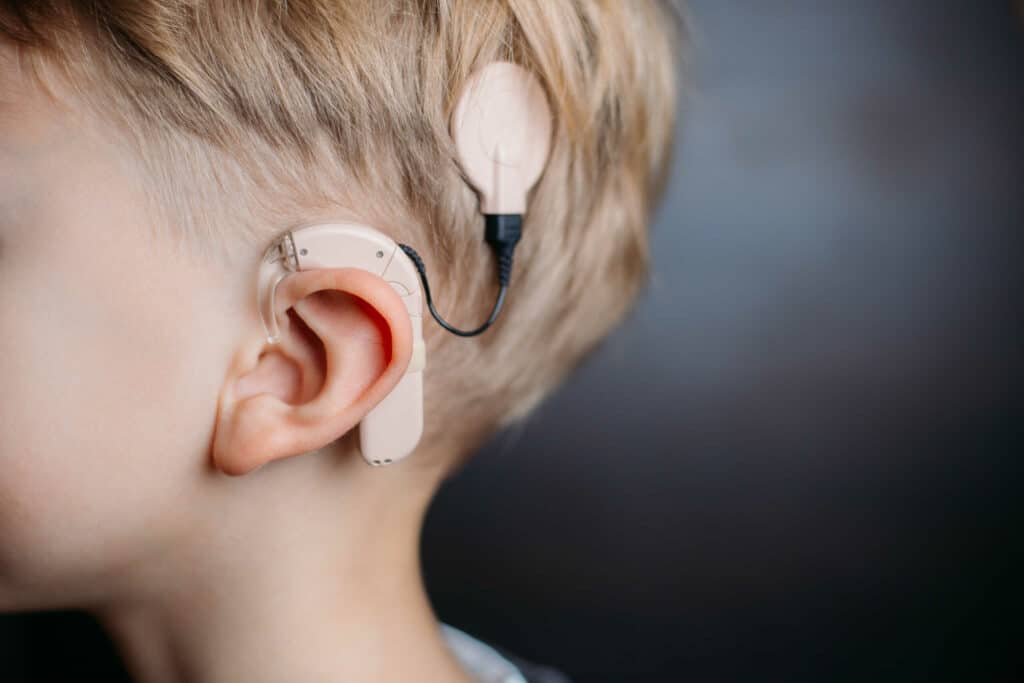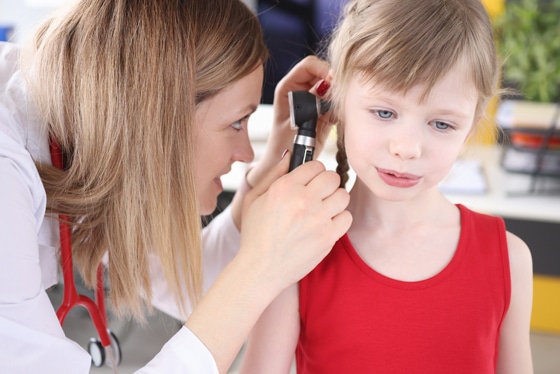Pediatric hearing loss is a challenging diagnosis at any age and is a critical issue, as even mild hearing loss can significantly affect a child’s development. Hearing loss in children can be hereditary or caused by external factors after birth, and it can lead to speech and learning delays as well as social and emotional development issues.
Identifying hearing loss early and providing appropriate interventions can help improve a child’s well-being and ensure they reach their fullest potential. While there is no cure or quick fix for pediatric hearing loss, there are several hearing loss treatments that can help improve a child’s hearing.
Can a Child’s Hearing Improve?
Illnesses like ear infections can cause blockages and temporary hearing loss, while congenital and non-congenital factors can lead to permanent hearing loss. Cochlear implants, hearing aids, and speech therapy can help to improve hearing significantly.
Congenital hearing loss is when an infant experiences hearing loss from birth, and genetics are a primary factor. One or both parents can carry a dominant hearing loss gene that can be passed to a child. Hearing loss can be associated with hereditary syndromes like Down syndrome or non-hereditary factors like prenatal infection or premature birth. Non-congenital hearing loss in children can occur due to illnesses like meningitis or chickenpox, which can cause ear inflammation that results in permanent damage to the ear.
When you see signs of hearing loss in your child, it can be managed and improved with cutting-edge technology and experienced professionals.
Cochlear Implants
Although they are commonly confused with hearing aids, cochlear implants do more than just amplify sound. Cochlear implants are surgical implants that stimulate nerve endings to translate sound into signals that can be interpreted by the brain. It is an assistive technology with a two-part mechanism: a surgical implant on the cochlea and an external component. The exterior feature is a microphone and speech processor that transmits the sounds to improve hearing. The unique technology helps children understand sounds and speech and can dramatically impact the ability to hear and develop language skills.

Cochlear implants can improve hearing for a lifetime and are ideal for children with bilateral sensorineural hearing loss. They provide new opportunities for those with severe hearing loss to comprehend speech, words, and conversations in quiet and noisy environments. With a cochlear implant, children can learn to recognize language and sounds more efficiently, making them more successful in academic and social settings. Because it is surgically implanted, it is often more secure than hearing aids, which can be lost or damaged with active young children. Implants also improve the safety risks associated with limited hearing, enabling children to be alerted to danger by hearing alarms, sirens, or shouting.
Hearing Aids
Hearing aids are also a convenient hearing loss treatment, as they come in various styles and are adjustable to meet an individual’s needs. Hearing aids are non-invasive devices worn outside one or both ears that can help children with mild hearing loss. They convert sounds into waves and electrical signals in the ear and amplify them for enhanced hearing. Hearing aids help to make speech and noises more audible and improve speech comprehension and communication.
Speech Therapy
Speech therapy is essential for improving hearing loss and comprehending and communicating effectively. Speech therapy can be a standalone treatment in very mild cases of hearing loss, but it is often used with children who have hearing aids or a cochlear implant.
When a child has hearing loss, speech therapy can help correct misunderstandings and teach the child how to use their voice better and understand communication cues. Speech therapy is an individualized program that considers the child’s unique strengths and weaknesses and provides a custom treatment plan to improve a child’s hearing. For a child with extreme hearing loss, speech therapy may consist of sign language only or a combination of listening and signing skills.
Find Out How Our Pediatric Otolaryngologists Can Help
Pediatric otolaryngologists specialize in children’s ear, nose, and throat (ENT) care. At Pediatric ENT Associates at Children’s of Alabama, our team of highly trained, board-certified surgeons specialize in the diagnostic and surgical care of head and neck diseases, including hearing loss in children. We are experts in different types of hearing loss a child can experience and can offer exceptional treatments that improve hearing and quality of life.
Our pediatric otolaryngologists can perform cochlear implant surgery and give families information and resources for success. Contact us today to schedule a consultation and learn more about how you can improve your child’s hearing loss.


